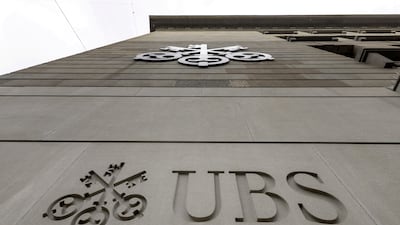UBS Group expects a financial hit of about $17 billion from the takeover of Credit Suisse Group, the bank said in a presentation on Wednesday, as it prepares to complete the rescue of its struggling Swiss rival.
UBS estimates a negative impact of $13 billion from fair value adjustments of the combined group's assets and liabilities. It also sees $4 billion in potential litigation and regulatory costs stemming from outflows, the bank said.
UBS, however, also estimated it would book a one-off gain stemming from the so-called “negative goodwill” of $34.8 billion by buying Credit Suisse for a fraction of its book value.
The financial cushion will help absorb potential losses and could result in a boost to the lender's second-quarter profit if it closes the transaction in June as planned.
The bank said that the estimates were preliminary and the numbers could change.
It also said that it might book restructuring provisions after that, but offered no numbers.
Analysts at Jefferies had estimated restructuring costs, litigation provisions and the planned winding down of the non-core unit could total $28 billion.
Separately, UBS said it was rushed into buying Credit Suisse in a deal it did not want, as a global crisis worsened the latter's finances and prompted authorities to take swift action.
In a filing to the US Securities and Exchange Commission on Tuesday, UBS told investors it had less than four days to conduct due diligence given the “emergency circumstances”.
Switzerland's biggest bank agreed to buy its smaller rival after the latter had endured a difficult year.
Credit Suisse's involvement in a series of corporate collapses spooked clients who began withdrawing their money, a trend that accelerated when US bank failures sparked fear of a broader banking crisis.
The wave of deposit outflows and a major share-price drop prompted Switzerland's central bank on March 15 to offer Credit Suisse liquidity assistance.
The next day, UBS and Credit Suisse signed a confidentiality agreement upon which the former began due diligence, the UBS filing showed.
On March 19, the Swiss National Bank announced UBS would buy Credit Suisse for 3 billion Swiss francs ($3.4 billion) in stock and assume a loss of as much as 5 billion francs stemming from winding down part of the business.
The final price was raised from an initial 1 billion francs, the filing showed.
Interest from UBS in buying Credit Suisse began in October when the ad hoc strategy committee of its board of directors reviewed its rival's distressed situation, according to the filing.
By then, Credit Suisse was experiencing deposit and net asset outflows at levels substantially exceeding rates of the July-September quarter, UBS said.
In early December, UBS management undertook a preliminary assessment of the consequences of a Credit Suisse purchase, which it presented to the strategy committee on December 19.
In February, the strategy committee and board of directors each concluded an acquisition was “not desirable” and recommended further analysis to prepare for a scenario in which Credit Suisse was in such difficulty that regulators could ask UBS to step in.
UBS said it carried out financial analyses from January to mid-March and assessed potential legal structures and possible measures to address concerns, as well as any negative impact, in case authorities proposed an acquisition.
From December to mid-January, Credit Suisse executives had also been talking to the government about its options including a merger with UBS, the UBS filing showed.

The UBS-Credit Suisse deal, the first rescue of a global bank since the 2008 financial crisis, will create a wealth manager with more than $5 trillion in invested assets and over 120,000 employees globally.
The Swiss state is backing the deal with up to 250 billion Swiss francs in public funds.
Switzerland's government is providing a guarantee of up to 9 billion francs for further potential losses on a clearly defined part of Credit Suisse portfolio.
UBS signalled no quick turnaround for the 167-year-old Credit Suisse, which came to the brink of collapse during the recent banking sector turmoil after years of scandals and losses.
It said it expected both the Credit Suisse group and its investment bank to report substantial pre-tax losses in the second quarter and the whole of this year.
Following the legal closing of the transaction, UBS Group plans to manage two separate parent companies – UBS and Credit Suisse, UBS said last week. It has said the integration process could take three to four years.
During that time, each institution will continue to have its own subsidiaries and branches, serve its clients and deal with counterparties.
While UBS prepares to complete its forced takeover of Credit Suisse, it has implemented a number of restrictions on the lender.
In certain cases, Credit Suisse cannot grant a new credit facility or credit line exceeding 100 million Swiss francs to investment-grade borrowers or more than 50 million francs to non-investment-grade borrowers, a UBS filing showed.
Credit Suisse also cannot undertake capital expenditure of more than 10 million francs or enter into certain contracts worth more than 3 million francs per year.
The filing shows Credit Suisse cannot order any “material amendments” to its employee terms and conditions, including remuneration and pension entitlements, until the closure of the deal.
